- Home
- Oliver Sacks
The man who mistook his wife for a hat Page 5
The man who mistook his wife for a hat Read online
Page 5
*See A.R. Luria, The Neuropsychology of Memory (1976), pp. 250-2.
trieved was fragmentary, unconnected. I his was the case in 1975, and it is still the case now, nine years later.
What could we do? What should we do? There are no prescriptions,' Luria wrote, 'in a case like this. Do whatever your ingenuity and your heart suggest. There is little or no hope of any recovery in his memory. But a man does not consist of memory alone. He has feeling, will, sensibilities, moral being-matters of which neuropsychology cannot speak. And it is here, beyond the realm of an impersonal psychology, that you may find ways to touch him, and change him. And the circumstances of your work especially allow this, for you work in a Home, which is like a little world, quite different from the clinics and institutions where I work. Neuropsychological!}', there is little or nothing you can do; but in the realm of the Individual, there may be much you can do.'
Luria mentioned his patient Kur as manifesting a rare self-awareness, in which hopelessness was mixed with an odd equanimity. 'I have no memory of the present,' Kur would say. 'I do not know what I have just done or from where I have just come … I can recall my past very well, but I have no memory of my present.' When asked whether he had ever seen the person testing him, he said, 'I cannot say yes or no, I can neither affirm nor deny that I have seen you.' This was sometimes the case with Jimmie; and, like Kur, who stayed many months in the same hospital, Jimmie began to form 'a sense of familiarity'; he slowly learned his way around the home-the whereabouts of the dining room, his own room, the elevators, the stairs, and in some sense recognised some of the staff, although he confused them, and perhaps had to do so, with people from the past. He soon became fond of the nursing sister in the Home; he recognised her voice, her footfalls, immediately, but would always say that she had been a fellow pupil at his high school, and was greatly surprised when I addressed her as 'Sister'.
'Gee!' he exclaimed, 'the damnedest things happen. I'd never have guessed you'd become a religious, Sister!'
Since he's been at our Home-that is, since early 1975-Jimmie has never been able to identify anyone in it consistently. The
only person he truly recognises is his brother, whenever he visits from Oregon. These meetings are deeply emotional and moving to observe-the only truly emotional meetings Jimmie has. He loves his brother, he recognises him, but he cannot understand why he looks so old: 'Guess some people age fast,' he says. Actually his brother looks much younger than his age, and has the sort of face and build that change little with the years. These are true meetings, Jimmie's only connection of past and present, yet they do nothing to provide any sense of history or continuity. If anything they emphasise-at least to his brother, and to others who see them together-that Jimmie still lives, is fossilised, in the past.
All of us, at first, had high hopes of helping Jimmie-he was so personable, so likable, so quick and intelligent, it was difficult to believe that he might be beyond help. But none of us had ever encountered, even imagined, such a power of amnesia, the possibility of a pit into which everything, every experience, every event, would fathomlessly drop, a bottomless memory-hole that would engulf the whole world.
I suggested, when I first saw him, that he should keep a diary, and be encouraged to keep notes every day of his experiences, his feelings, thoughts, memories, reflections. These attempts were foiled, at first, by his continually losing the diary: it had to be attached to him-somehow. But this too failed to work: he dutifully kept a brief daily notebook but could not recognise his earlier entries in it. He does recognise his own writing, and style, and is always astounded to find that he wrote something the day before.
Astounded-and indifferent-for he was a man who, in effect, had no 'day before'. His entries remained unconnected and un-connecting and had no power to provide any sense of time or continuity. Moreover, they were trivial-'Eggs for breakfast', 'Watched ballgame on TV-and never touched the depths. But were there depths in this unmemoried man, depths of an abiding feeling and thinking, or had he been reduced to a sort of Humean drivel, a mere succession of unrelated impressions and events?
Jimmie both was and wasn't aware of this deep, tragic loss in himself, loss of himself. (If a man has lost a leg or an eye, he knows he has lost a leg or an eye; but if he has lost a self-
himself-he cannot know it, because he is no longer there to know it.) Therefore I could not question him intellectually about such matters.
He had originally professed bewilderment at finding himself amid patients, when, as he said, he himself didn't feel ill. But what, we wondered, did he feel? He was strongly built and fit, he had a sort of animal strength and energy, but also a strange inertia, passivity, and (as everyone remarked) 'unconcern'; he gave all of us an overwhelming sense of'something missing,' although this, if he realised it, was itself accepted with an odd 'unconcern.' One day I asked him not about his memory, or past, but about the simplest and most elemental feelings of all:
'How do you feel?'
'How do I feel,' he repeated, and scratched his head. 'I cannot say I feel ill. But I cannot say I feel well. I cannot say I feel anything at all.'
'Are you miserable?' I continued.
'Can't say I am.'
'Do you enjoy life?'
'I can't say I do … '
I hesitated, fearing that I was going too far, that I might be stripping a man down to some hidden, unacknowledgeable, unbearable despair.
'You don't enjoy life,' I repeated, hesitating somewhat. 'How then do you feel about life?'
'I can't say that I feel anything at all.'
'You feel alive though?'
'Feel alive? Not really. I haven't felt alive for a very long time.'
His face wore a look of infinite sadness and resignation.
Later, having noted his aptitude for, and pleasure in, quick games and puzzles, and their power to 'hold' him, at least while they lasted, and to allow, for a while, a sense of companionship and competition-he had not complained of loneliness, but he looked so alone; he never expressed sadness, but he looked so sad- I suggested he be brought into our recreation programs at the Home. This worked better-better than the diary. He would become keenly and briefly involved in games, but soon they ceased
to offer any challenge: he solved all the puzzles, and could solve them easily; and he was far better and sharper than anyone else at games. And as he found this out, he grew fretful and restless again, and wandered the corridors, uneasy and bored and with a sense of indignity-games and puzzles were for children, a diversion. Clearly, passionately, he wanted something to do: he wanted to do, to be, to feel-and could not; he wanted sense, he wanted purpose-in Freud's words, 'Work and Love'.
Could he do 'ordinary' work? He had 'gone to pieces', his brother said, when he ceased to work in 1965. He had two striking skills- Morse code and touch-typing. We could not use Morse, unless we invented a use; but good typing we could use, if he could recover his old skills-and this would be real work, not just a game. Jimmie soon did recover his old skill and came to type very quickly-he could not do it slowly-and found in this some of the challenge and satisfaction of a job. But still this was superficial tapping and typing; it was trivial, it did not reach to the depths. And what he typed, he typed mechanically-he could not hold the thought-the short sentences following one another in a meaningless order.
One tended to speak of him, instinctively, as a spiritual casualty-a 'lost soul': was it possible that he had really been 'de-souled' by a disease? 'Do you think he has a soul?' I once asked the Sisters. They were outraged by my question, but could see why I asked it. 'Watch Jimmie in chapel,' they said, 'and judge for yourself
I did, and I was moved, profoundly moved and impressed, because I saw here an intensity and steadiness of attention and concentration that I had never seen before in him or conceived him capable of. I watched him kneel and take the Sacrament on his tongue, and could not doubt the fullness and totality of Communi
on, the perfect alignment of his spirit with the spirit of the Mass. Fully, intensely, quietly, in the quietude of absolute concentration and attention, he entered and partook of the Holy Communion. He was wholly held, absorbed, by a feeling. There was no forgetting, no Korsakov's then, nor did it seem possible or imaginable that there should be; for he was no longer at the mercy
of a faulty and fallible mechanism-that of meaningless sequences and memory traces-but was absorbed in an act, an act of his whole being, which carried feeling and meaning in an organic continuity and unity, a continuity and unity so seamless it could not permit any break.
Clearly Jimmie found himself, found continuity and reality, in the absoluteness of spiritual attention and act. The Sisters were right-he did find his soul here. And so was Luria, whose words now came back to me: 'A man does not consist of memory alone. He has feeling, will, sensibility, moral being … It is here . . . you may touch him, and see a profound change.' Memory, mental activity, mind alone, could not hold him; but moral attention and action could hold him completely.
But perhaps 'moral' was too narrow a word-for the aesthetic and dramatic were equally involved. Seeing Jim in the chapel opened my eyes to other realms where the soul is called on, and held, and stilled, in attention and communion. The same depth of absorption and attention was to be seen in relation to music and art: he had no difficulty, I noticed, 'following' music or simple dramas, for every moment in music and art refers to, contains, other moments. He liked gardening, and had taken over some of the work in our garden. At first he greeted the garden each day as new, but for some reason this had become more familiar to him than the inside of the Home. He almost never got lost or disoriented in the garden now; he patterned it, I think, on loved and remembered gardens from his youth in Connecticut.
Jimmie, who was so lost in extensional 'spatial' time, was perfectly organised in Bergsonian 'intentional' time; what was fugitive, unsustainable, as formal structure, was perfectly stable, perfectly held, as art or will. Moreover, there was something that endured and survived. If Jimmie was briefly 'held' by a task or puzzle or game or calculation, held in the purely mental challenge of these, he would fall apart as soon as they were done, into the abyss of his nothingness, his amnesia. But if he was held in emotional and spiritual attention-in the contemplation of nature or art, in listening to music, in taking part in the Mass in chapel-the attention, its 'mood', its quietude, would persist for a while, and there
would be in him a pensiveness and peace we rarely, if ever, saw during the rest of his life at the Home.
I have known Jimmie now for nine years-and neuropsychologically, he has not changed in the least. He still has the severest, most devastating Korsakov's, cannot remember isolated items for more than a few seconds, and has a dense amnesia going back to 1945. But humanly, spiritually, he is at times a different man altogether-no longer fluttering, restless, bored, and lost, but deeply attentive to the beauty and soul of the world, rich in all the Kier-kegaardian categories-and aesthetic, the moral, the religious, the dramatic. I had wondered, when I first met him, if he was not condemned to a sort of 'Humean' froth, a meaningless fluttering on the surface of life, and whether there was any way of transcending the incoherence of his Humean disease. Empirical science told me there was not-but empirical science, empiricism, takes no account of the soul, no account of what constitutes and determines personal being. Perhaps there is a philosophical as well as a clinical lesson here: that in Korsakov's, or dementia, or other such catastrophes, however great the organic damage and Humean dissolution, there remains the undiminished possibility of reintegration by art, by communion, by touching the human spirit: and this can be preserved in what seems at first a hopeless state of neurological devastation.
Postscript
I know now that retrograde amnesia, to some degree, is very common, if not universal, in cases of Korsakov's. The classical Korsakov's syndrome-a profound and permanent, but 'pure', devastation of memory caused by alcoholic destruction of the mammillary bodies- is rare, even among very heavy drinkers. One may, of course, see Korsakov's syndrome with other pathologies, as in Luria's patients with tumours. A particularly fascinating case of an acute (and mercifully transient) Korsakov's syndrome has been well described only very recently in the so-called Transient Global Amnesia (TGA) which may occur with migraines, head injuries or impaired blood supply to the brain. Here, for a few minutes or hours, a severe and
singular amnesia may occur, even though the patient may continue to drive a car, or, perhaps, to carry on medical or editorial duties, in a mechanical way. But under this fluency lies a profound amnesia- every sentence uttered being forgotten as soon as it is said, everything forgotten within a few minutes of being seen, though long-established memories and routines may be perfectly preserved. (Some remarkable videotapes of patients during TGAs have recently [1986] been made by Dr John Hodges, of Oxford.)
Further, there may be a profound retrograde amnesia in such cases. My colleague Dr. Leon Protass tells me of a case seen by him recently, in which a highly intelligent man was unable for some hours to remember his wife or children, to remember that he had a wife or children. In effect, he lost thirty years of his life- though, fortunately, for only a few hours. Recovery from such attacks is prompt and complete-yet they are, in a sense, the most horrifying of 'little strokes' in their power absolutely to annul or obliterate decades of richly lived, richly achieving, richly memo-ried life. The horror, typically, is only felt by others-the patient, unaware, amnesiac for his amnesia, may continue what he is doing, quite unconcerned, and only discover later that he lost not only a day (as is common with ordinary alcoholic 'blackouts'), but half a lifetime, and never knew it. The fact that one can lose the greater part of a lifetime has peculiar, uncanny horror.
In adulthood, life, higher life, may be brought to a premature end by strokes, senility, brain injuries, etc., but there usually remains the consciousness of life lived, of one's past. This is usually felt as a sort of compensation: 'At least I lived fully, tasting life to the full, before I was brain-injured, stricken, etc.' This sense of 'the life lived before', which may be either a consolation or a torment, is precisely what is taken away in retrograde amnesia. The 'final amnesia, the one that can erase an entire life' that Bunuel speaks of may occur, perhaps, in a terminal dementia, but not, in my experience, suddenly, in consequence of a stroke. But there is a different, yet comparable, sort of amnesia, which can occur suddenly-different in that it is not 'global' but 'modality-specific'.
Thus, in one patient under my care, a sudden thrombosis in
the posterior circulation of the brain caused the immediate death of the visual parts of the brain. Forthwith this patient became completely blind-but did not know it. He looked blind-but he made no complaints. Questioning and testing showed, beyond doubt, that not only was he centrally or 'cortically' blind, but he had lost all visual images and memories, lost them totally-yet had no sense of any loss. Indeed, he had lost the very idea of seeing-and was not only unable to describe anything visually, but bewildered when I used words such as 'seeing' and 'light.' He had become, in essence, a non-visual being. His entire lifetime of seeing, of visuality, had, in effect, been stolen. His whole visual life had, indeed, been erased-and erased permanently in the instant of his stroke. Such a visual amnesia, and (so to speak) blindness to the blindness, amnesia for the amnesia, is in effect a 'total' Korsakov's, confined to visuality.
A still more limited, but none the less total, amnesia may be displayed with regard to particular forms of perception, as in the last chapter, 'The Man Who Mistook His Wife for a Hat'. There there was an absolute 'prosopagnosia', or agnosia for faces. This patient was not only unable to recognise faces, but unable to imagine or remember any faces-he had indeed lost the very idea of a 'face', as my more afflicted patient had lost the very ideas of'seeing' or 'light.' Such syndromes were described by Anton in the 1890s. But the implication of these syndromes-Korsakov's and Anton'
s-what they entail and must entail for the world, the lives, the identities of affected patients, has been scarcely touched on even to this day.
In Jimmie's case, we had sometimes wondered how he might respond if taken back to his home town-in effect, to his pre-amnesia days- but the little town in Connecticut had become a booming city with the years. Later I did have occasion to find out what might happen in such circumstances, though this was with another patient with Korsakov's, Stephen R., who had become acutely ill in 1980 and whose retrograde amnesia went back only two years or so. With this patient, who also had severe seizures, spasticity and other problems necessitating in-patient care, rare weekend visits to his home revealed
a poignant situation. In hospital he could recognise nobody and nothing, and was in an almost ceaseless frenzy of disorientation. But when his wife took him home, to his house which was in effect a 'time-capsule' of his pre-amnesia days, he felt instantly at home. He recognised everything, tapped the barometer, checked the thermostat, took his favourite armchair, as he used to do. He spoke of neighbours, shops, the local pub, a nearby cinema, as they had been in the mid-Seventies. He was distressed and puzzled if the smallest changes were made in the house. ('You changed the curtains today!' he once expostulated to his wife. 'How come? So suddenly? They were green this morning.' But they had not been green since 1978.) He recognised most of the neighbouring houses and shops-they had changed little between 1978 and 1983-but was bewildered by the 'replacement' of the cinema ('How could they tear it down and put up a supermarket overnight?'). He recognised friends and neighbours-but found them oddly older than he expected ('Old so-and-so! He's really showing his age. Never noticed it before. How come everyone's showing their age today?'). But the real poignancy, the horror, would occur when his wife brought him back-brought him, in a fantastic and unaccountable manner (so he felt), to a strange home he had never seen, full of strangers, and then left him. 'What are you doing?' he would scream, terrified and confused. 'What in the hell is this place? What the hell's going on?' These scenes were almost unbearable to watch, and must have seemed like madness, or nightmare, to the patient. Mercifully perhaps he would forget them within a couple of minutes.

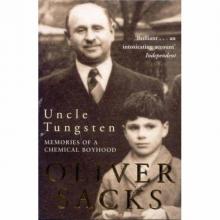 Uncle Tungsten
Uncle Tungsten Oaxaca Journal
Oaxaca Journal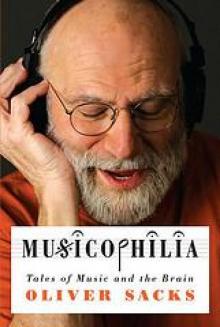 Musicophilia
Musicophilia The man who mistook his wife for a hat
The man who mistook his wife for a hat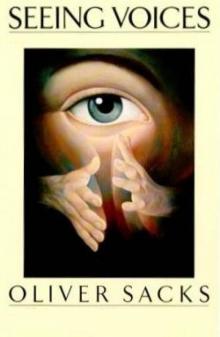 1989 - Seeing Voices
1989 - Seeing Voices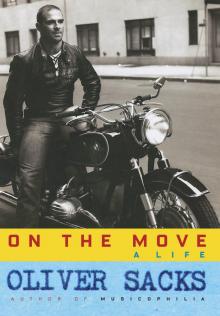 On the Move: A Life
On the Move: A Life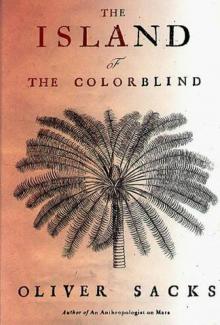 1996 - The Island of the Colorblind
1996 - The Island of the Colorblind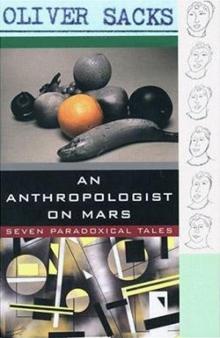 An Anthropologist on Mars: Seven Paradoxical Tales
An Anthropologist on Mars: Seven Paradoxical Tales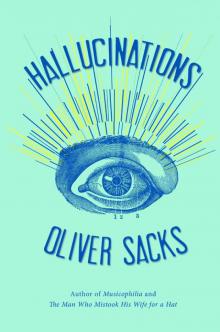 Hallucinations
Hallucinations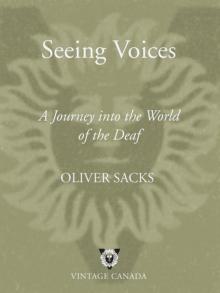 Seeing Voices
Seeing Voices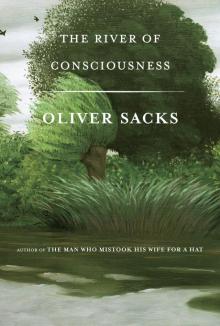 The River of Consciousness
The River of Consciousness Vintage Sacks
Vintage Sacks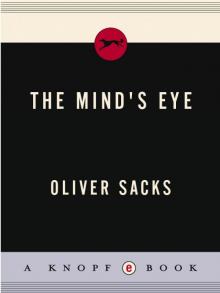 The Mind's Eye
The Mind's Eye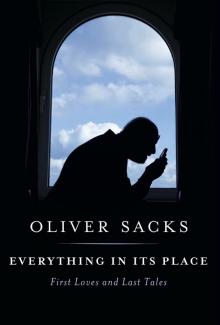 Everything in Its Place
Everything in Its Place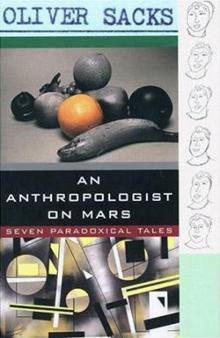 An Anthropologist on Mars (1995)
An Anthropologist on Mars (1995)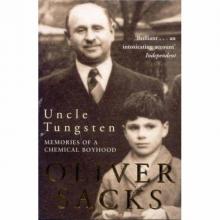 Uncle Tungsten: Memories of a Chemical Boyhood (2001)
Uncle Tungsten: Memories of a Chemical Boyhood (2001)